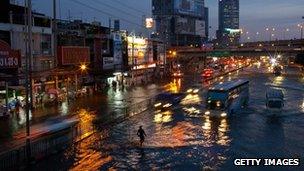Thailand flooding death toll 'tops 500'
- Published
Floodwater is continuing to spread through Thai captial of Bangkok
The number of people killed by months of flooding in northern Thailand has risen to more than 500, officials say.
Three months of heavy rain have affected about a third of Thailand's province, destroying farmland and forcing tens of thousands from their homes.
Large parts of the capital Bangkok are also flooded and there are fears the city centre could yet be worse hit.
The government has announced a 100bn baht ($4bn: £2.5bn) recovery plan.
Prime Minister Yingluck Shinawatra said the money would be used to rebuild homes and businesses and restore the economy, which has been badly affected.
"The work must be completed in 45 days because people have suffered for so long already," the Bangkok Post quoted Ms Yingluck as saying.
She asked for public understanding as the government tackles the disaster, saying: "I admit that this task has really exhausted me, but I will never give up."
The authorities have come under criticism for what is perceived as a slow response to the flooding, and for giving conflicting advice about evacuations.
The waters are now receding in the north of the country but Department of Prevention and Mitigation said on Sunday that 506 people were now known to have died since July.
The BBC's Rachel Harvey in Bangkok says doubts are growing again about whether the authorities will be able to protect the capital.
The city, which is criss-crossed by rivers and canals, has been threatened by encroaching water for weeks as the floods drain towards the sea.
Nobody has died in the capital, but a fifth of the city is now under water and tens of thousands of residents of eight of the 50 districts have been told to leave their homes.
Rows between the government and the Bangkok administration about how to handle the crisis have undermined public confidence in their efforts, says our correspondent.
On Saturday, Bangkok governor Sukhumbhand Paribatra warned that the city authorities would throw out the central government's flood management plan and bring in their own unless co-operation between the two agencies improved, the Bangkok Post reports.
There are growing concerns about the health problems of large amounts of polluted water - which is up to chest height in some areas - flowing through the densely populated city.
Airport flooded
The waters have now reached the Chatuchak market, a major outdoor shopping centre and tourist attraction north of the business district.

Hundreds of thousands of people have had to leave their homes in the capital
Many of the thousands of storeholders have followed official advice and temporarily shut up shop.
"There will be no-one able to come around to sell and to buy. So, doesn't make sense to keep the market open," Tinnakorn Rujinarong, deputy director of the market, told the Reuters news agency.
But others have refused to close, saying they could not risk losing what trade there was.
"When tourists come here to find this place closed down for too long, they will not come back again. And it will take a long time to bring the market back to booming again," said one food stall trader.
The city's second airport, Don Muang, is under water but the main international airport at Suvarnabhumi and the city's transport system are still operating.
Emergency workers are continuing to distribute sandbags and attempting to divert the water through canals.
However some residents on the edges of Bangkok have accused the authorities of sacrificing their homes to save the commercial centre.
- Published4 November 2011
- Published25 October 2011
- Published22 October 2011